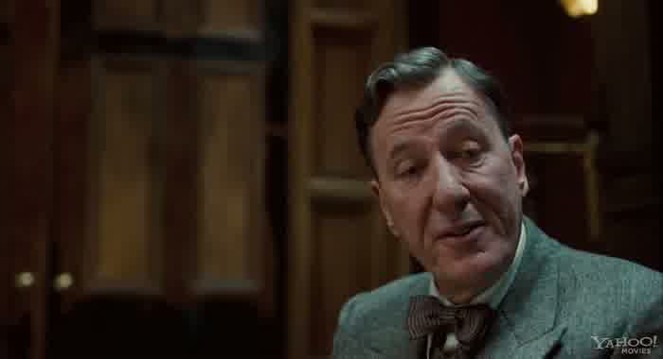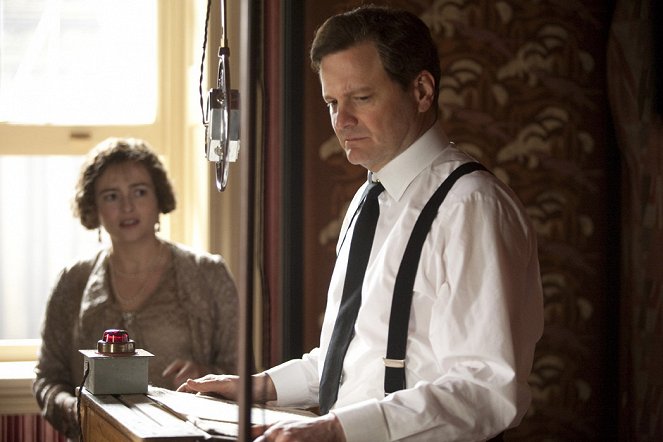Directed by:
Tom HooperScreenplay:
David SeidlerCinematography:
Danny CohenComposer:
Alexandre DesplatCast:
Colin Firth, Helena Bonham Carter, Derek Jacobi, Geoffrey Rush, Richard Dixon, Jennifer Ehle, Ramona Marquez, David Bamber, Michael Gambon, Guy Pearce (more)VOD (5)
Plots(1)
After the death of his father King George V (Michael Gambon) and the scandalous abdication of King Edward VIII (Guy Pearce), Bertie (Colin Firth) who has suffered from a debilitating speech impediment all his life, is suddenly crowned King George VI of England. With his country on the brink of war and in desperate need of a leader, his wife, Elizabeth (Helena Bonham Carter), the future Queen Mother, arranges for her husband to see an eccentric speech therapist, Lionel Logue (Geoffrey Rush). After a rough start, the two delve into an unorthodox course of treatment and eventually form an unbreakable bond. With the support of Logue, his family, his government and Winston Churchill (Timothy Spall), the King will overcome his stammer and deliver a radio-address that inspires his people and unites them in battle. Based on the true story of King George VI, THE KING'S SPEECH follows the Royal Monarch's quest to find his voice. (official distributor synopsis)
(more)Videos (5)
Reviews (11)
The King’s Speech is distinguished by its wonderful camerawork and set designs (the walk through a foggy park with conical trees is an aesthetic orgasm), brilliant actors, handicapped main character (with a heartbreaking crying scene), a loving wife, and when things come to the worst, a sudden sense of urgency brought on by Hitler's coming to power. The film has the pure soul of Rain Man placed in noble English setting in the style of Merchant-Ivory productions, or another certain way to get an Oscar, though this time it is truly kind and sincere. But let’s not be sentimental – Tom Hooper “only” perfectly utilized everything he had been taught at film school and what he learned both in Hollywood and England, and he did not bring any unique artist’s imprint into his work or push filmmaking forward. That’s why during the Academy Awards, I kept my fingers crossed for the more special, bolder and progressive artists Fincher and Aronofsky.
()
A very enjoyable intimate drama about real issues against the backdrop of historical events. The cast is great, of course, but in a way too much so, because each of the main three characters is such a distinct actor that they overshadow their characters. The set design also has no major flaws, which is good, although that’s almost a given nowadays.
()
Serious themes of an interesting era in the chronicle of humanity, the beauty of Victorian England (exteriors/interiors, aesthetics), and a lead cast of two. These are the three main assets in this formally meticulously done film, which lacks pull and a good dose of emotion. The sparkle is not enough. If Tom Hooper wasn't just a good craftsman, but a progressive innovator who could put his own distinctive spin on things (and there was a ton of room for that here), this would be downright great. Academics have lost their minds over something that isn’t nearly that great.
()
A cultured speech therapy drama about the power of the voice and the imaginary status of a king. A wonderfully blissful play of static semi-details, mannerist textures and refined interiors, against which the chaotic wallpaper of Dr. Logue proudly stands out, who understands that the king is king above all when his subjects believe him. And in the 1930s, they can trust his voice above all. It's all a typical Rocky template about an outsider who climbed to the top, even though no one believed in him. Even with its sensitively stylizing representation of history, it is the equivalent of the excellent drama Frost/Nixon. An acting concert, from Colin Firth's stressed-out creation to Helen Bonham Carter's light-legged ballet. Maybe over-modified, but I like it... more than a handsome, gelled Fincher mop of hair.
()
A typically British, perfectionistic, and old-fashioned film, which, although it has a number of undeniable merits starting with excellent casting, appropriate performances, and conservative but flawless direction, somehow did not enthuse me and captivate me. It deals with aristocratic "better" people bound by strict social rules, etiquette, and responsibility, not for themselves, but for the reputation and status of their family. These people have sympathy for the plebeians down below and feel responsibility for them about as much as a medieval feudal lord felt responsibility for his subjects. By the way, they reduce people to one group and even though they talk a great deal about that group, they are extremely careful not to get themselves dirty with the people below and actually do not even know them. Overall impression: 80%.
()



Ads